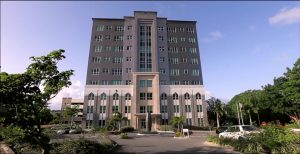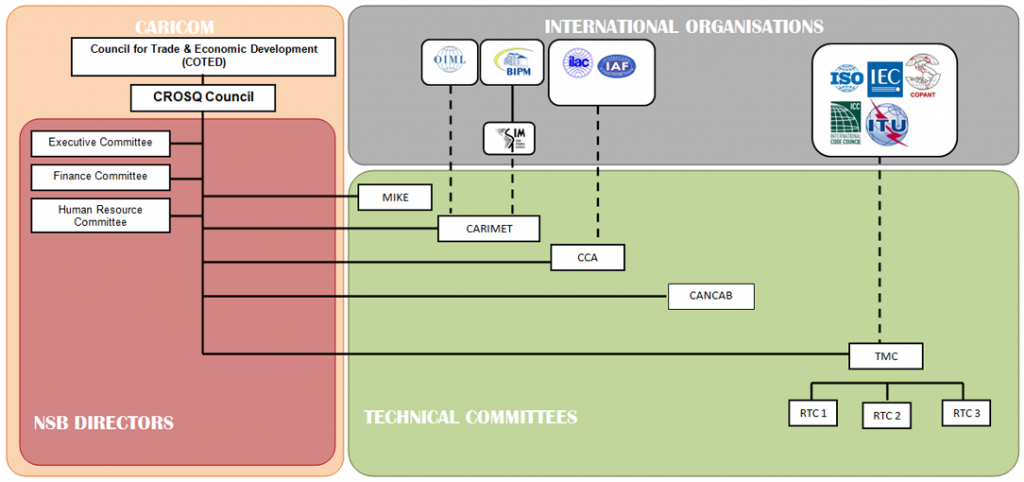
CROSQ is a regional inter-governmental organization established in February 2002 to facilitate the development of regional standards, promote the harmonization of metrology systems and support the sustainable production and trade of goods and services in the CARICOM Single Market and Economy (CSME).
Headquartered in Barbados, CROSQ is the regional centre for promoting efficiency and competitive production in goods and services, through the process of standardization and the verification of quality. In this regard, CROSQ aims to support international competitiveness for the enhancement of social and economic development of the region.
All fifteen (15) Member States of CARICOM are members of CROSQ – Antigua and Barbuda, The Bahamas, Barbados, Belize, Dominica, Grenada, Guyana, Haiti, Jamaica, Montserrat, St. Kitts and Nevis, Saint Lucia, St. Vincent and the Grenadines, Suriname, and Trinidad and Tobago.
Vision
Transforming and Empowering Lives Through Standards and Quality
Mission
Working together to facilitate the growth, resilience and sustainable development of CARICOM through the advancement of an internationally recognised Regional Quality Infrastructure.
Organizational Structure
CROSQ reports to the CARICOM Council for Trade and Economic Development (COTED), which is responsible for the approval of standards, CROSQ’s work programme and budget. CROSQ is made up of:
- the Council, which consists of the Directors/Executive Directors (or representatives) of the National Standards Bodies (NSBs) of the representative Member States, who provide policy and direction;
- The Technical and Special Committees, which consist of stakeholders from private and public sector entities, who support the work of the organisation; and
- The Secretariat, which coordinates, facilitates and implements.
The Three (3) Technical Committees assist with the technical agenda of the CROSQ Council:
- The Technical Management Committee (TMC) was appointed in 2005 to assist with the development and harmonization of regional standards. Comprising of technical experts from among the NSBs, the TMC meets 3 to 4 times a year to oversee the process. Sector-specific Regional Technical Committees (RTCs), comprising relevant stakeholders and experts, develop and review the standards. The Editorial Committee has the responsibility for the final editing and formatting of the standards.
- CARIMET, the Caribbean arm of the Sistema Interamerican Metrologia (SIM), is made up of representatives of the National Metrology Institutes (NMIs) of the English-speaking Caribbean, including Belize, Guyana and Suriname. It has been in existence since the mid-1990s, and in April 2008, it was formally invited to participate within CROSQ as a special committee, with particular responsibility for the development and coordination of Metrology in the region.
- The Marketing Information Knowledge Management and Education (MIKE) Committee is made up of representatives from each of the National Standards Bodies in the areas of information technology, information management, marketing and communications, and WTO/TBT enquiry points and CODEX nodes. The MIKE Committee was established to assist in the development of information and communication technologies (ICT) within CROSQ. In recent years promotion of RQI has become a major focus of the committee as well.
Three administrative committees are appointed from among the Council members to facilitate the work of the Council in the management of the Secretariat. These are:
- The Executive Committee;
- The Finance Committee; and
- The Human Resource Committee
The CROSQ Council appoints a Chief Executive Officer (formerly Executive Secretary) to inter alia: manage the daily activities of the Secretariat and conduct general business activities on behalf of CROSQ; interface with the Council Members and COTED; manage relations with the donor agencies in the Region; and manage relations within CARICOM and with the various organs of CARICOM in relation to the objectives of CROSQ. The Secretariat’s core staff falls under technical operations, and finance and administration operations. In addition, project manager(s)/coordinator(s) and other Project Management Unit (PMU) support staff are hired on time-bound contracts to implement funded projects.

CROSQ’s Mandate
Promote the development and harmonisation of standards, metrology, technical regulations and the mutual recognition of conformity assessment procedures covering goods and services produced or provided in the Community, with the aim of facilitating trade and supporting the establishment of the CSME;
- Encourage the mutual recognition of accreditation and certification systems which are based on internationally accepted criteria;
- Facilitate the achievement of international competitiveness of regional goods and services by fostering a culture of quality in regional enterprises;
- Support standards-infrastructure development at the national level;
- Promote consumer welfare and safety;
- Contribute to the preservation of the environment and conservation of the natural resources of the Community;
- Provide guidance to Community Organs and Bodies regarding matters within its competence, including disputes settlement;
- Promote and protect the interests of States Parties and Associate Members in regional and international standardising fora, including external negotiations; and
- Promote awareness of standards and standards-related matters in governments, commerce, industry and consumers.
CROSQ’s Focus
CROSQ creates the environment for businesses in the CARICOM Member States to improve their trade competitiveness through harmonized QI. In the early years, CROSQ’s emphasis was on the development and harmonization of regional standards. However, in light of international trade agreements, CROSQ is focusing on international recognition of the other elements of a Regional QI (RQI).
